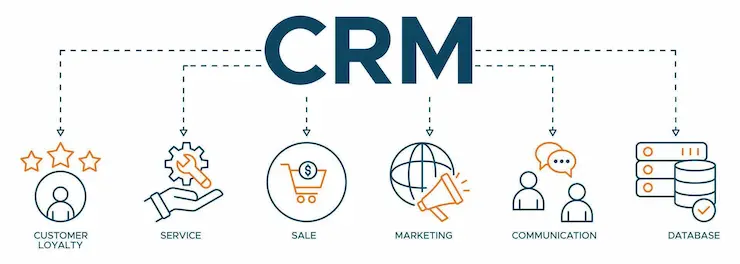
What does CRM means?
Customer Relationship Management (CRM) refers to a strategic approach and a suite of tools designed to manage and enhance interactions with both current and prospective customers. The primary objective of CRM is straightforward: to strengthen relationships and foster business growth. By leveraging CRM technology, companies can maintain a strong connection with their customers, streamline their processes, and ultimately boost their profitability.
Typically, when discussing CRM, we are referring to CRM systems—software solutions that meticulously track every interaction with prospects and customers. This can encompass a variety of activities, including sales calls, customer service exchanges, marketing emails, and more. CRM tools are designed to consolidate customer and company data from multiple sources and may incorporate artificial intelligence (AI) to improve relationship management throughout the entire customer journey. This integration spans across various departments such as marketing, sales, digital commerce, and customer service, ensuring a cohesive approach to customer engagement.
Why is implementing a CRM system crucial for your business?
Sales are fundamental to the success of any business, with many activities focused on driving sales performance. In today’s dynamic business landscape, relying solely on spreadsheets to manage data is increasingly inadequate. Spreadsheets often struggle with data accessibility, report generation, and analytics, and lack the advanced features necessary for thriving in today’s competitive environment. This is where CRM systems become invaluable. CRM solutions are specifically designed to overcome these limitations by improving lead generation, facilitating more meaningful interactions, and fostering a loyal customer base that actively supports your products. By equipping sales teams with timely and precise information, CRMs enhance the efficiency of deal closures and play a crucial role in driving overall business growth.
- Single Source of Truth:CRM provides a consolidated, secure, and customizable dashboard that delivers a clear, unified view of each customer profile. This centralized platform includes key details such as purchase history, order status, and any unresolved service issues. As per study, 90% of customers expect every representative they engage with to be aware of their past interactions and issues, having this comprehensive information readily available is essential for outstanding customer service.
- Cost Effective: Investing in a CRM system is cost-effective because it consolidates this data into a single, accessible platform. This reduces the risk of lost information and missed opportunities, ensures timely follow-ups, and allows for data-driven decision-making. By streamlining data management and improving efficiency, a CRM system helps avoid the costs associated with disorganization, data loss, and inefficient processes. In the long run, it saves money by maximizing productivity, enhancing customer satisfaction, and protecting your business's valuable information.
- Aligning Your Teams:A CRM system connects all your teams by keeping everyone on the same page. It centralizes important information so that marketers can manage campaigns effectively, commerce teams can offer personalized deals, and customer service can quickly access customer histories. This shared data streamlines processes, enhances teamwork, and improves the overall customer experience.
- Increasing productivity:Integrating CRM can yield substantial benefits for your business. By consolidating all customer information, you can enable highly personalized interactions. This enhanced understanding empowers your team to be more intelligent and efficient, providing valuable insights that improve accuracy in forecasting, whether it’s quarterly sales goals, ecommerce performance, or optimal timing for marketing emails.
Who can benefit from using a CRM system?
CRM systems have evolved significantly from their origins as simple contact management tools. Nowadays, they serve as powerful technological platforms that address a variety of business needs and improve customer interactions. Though accessible to anyone with a basic understanding, CRM systems are particularly beneficial for those in sales, marketing, and support roles. Designed with ease of use in mind, these systems offer extensive features and flexibility, making them ideal for enhancing daily operations across marketing, sales, and support functions.
- Sales
- Marketers
- Customer Support
- Management
- Engineering
Advantages of adopting a CRM
CRMs are crucial for modern sales and marketing. Without a solid CRM, businesses risk missing opportunities and experiencing inefficiencies. Here are key benefits of using an effective CRM:
- Automation
- Data driven decision
- Improved customer interaction
- Unified information
- Optimized operations
- Seamless team collaboration
key features of a CRM
- Contact Management
- Sales Automation
- Marketing Automation
- Customer Service and Support
- Analytics and Reporting
- Lead and Opportunity Management
- Task and Activity Management